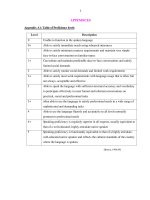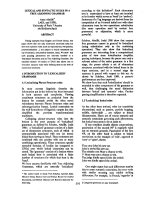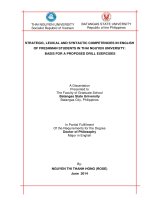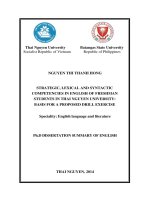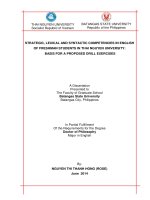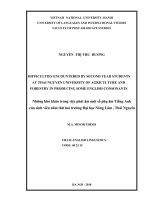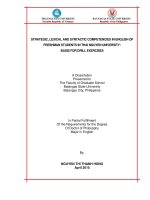strategic, lexical and syntactic competencies in english of freshman students in thai nguyen university - bais for a proposed drill exercises
Bạn đang xem bản rút gọn của tài liệu. Xem và tải ngay bản đầy đủ của tài liệu tại đây (2.1 MB, 215 trang )
THAI NGUYEN UNIVERSITY
Socialist Republic of Vietnam
BATANGAS STATE UNIVERSITY
Republic of the Philippines
i
STRATEGIC, LEXICAL AND SYNTACTIC COMPETENCIES IN ENGLISH
OF FRESHMAN STUDENTS IN THAI NGUYEN UNIVERSITY:
BASIS FOR A PROPOSED DRILL EXERCISES
A Dissertation
Presented to
The Faculty of Graduate School
Batangas State University
Batangas City, Philippines
In Partial Fulfillment
Of the Requirements for the Degree
Doctor of Philosophy
Major in English
By:
NGUYEN THI THANH HONG (ROSE)
June 2014
THAI NGUYEN UNIVERSITY
Socialist Republic of Vietnam
BATANGAS STATE UNIVERSITY
Republic of the Philippines
ii
ABSTRACT
Title :Strategic, lexical and syntactic competencies in
English of freshman students in Thai Nguyen
university: Basis for a proposed drill exercise.
Author : Nguyen Thi Thanh Hong
Course :Doctor of Philosophy major in English language and
literature.
Year : 2014
Adviser : Dr Amada G. Banaag
Summary
The main focus of this study was to determine the strategic,
lexical and syntactic competencies in English of freshman student Thai
Nguyen university.
This study made use of the descriptive method and utilized
researcher-constructed questionaire and teacher made test. For
objective interpretation and analysis of the study, the data were
subjected to the following statistical treatment: frequency, percentage,
ranking, independent t-test and standard deviation.
THAI NGUYEN UNIVERSITY
Socialist Republic of Vietnam
BATANGAS STATE UNIVERSITY
Republic of the Philippines
iii
The findings of the study revealed that majority of the freshman
students of Thai Nguyen University employed strategic competencies to
cope and promote their communication skills. Further, freshman
students have poor performance in the areas of vocabulary, idioms and
word formation but have better performance in synonyms and antonym;
they demonstrate poor performance in the areas of verb tenses, direct
and indirect speech, but have better or remarkable performance in the
areas of subject verb agreement, pronoun references and phrases and
clauses. In addition, There is no significant relationship exists between
students’ lexical and syntactic competencies. There exists a relationship
between teachers’ assessment and the level of students’ lexical and
syntactic competencies. Students did not frequently used or practice
their lexical and syntactic skills as indicated by their mean score of 3.0.
The drill exercises formulated contains activities geared towards
improving freshman students’ lexical and syntactic competencies in
Thai Nguyen university.
THAI NGUYEN UNIVERSITY
Socialist Republic of Vietnam
BATANGAS STATE UNIVERSITY
Republic of the Philippines
iv
ACKNOWLEDGEMENT
This dissertation wouldn’t have been possible had it not been for the
support, love, patience, and generosity of many people, who have
helped me in their own incredible way to deal with myself while trying to
find my voice in what I do.
I would especially like to acknowledge and thank Dr. Amanda G.
Banaag, who as a major professor and director of my dissertation
opened my eyes to see the details in the “big picture”. I highly admire
her scholarship, dedication, efficiency in decision-making, valuable
advice, to Dr. Maltida H. Dimaano, who has enormously helped me to
keep on moving. Had it not been for her constant administrative and
academic support, I doubt I would have finished the Program and my
dissertation in such a timely manner. There isn’t a quantifier in the
English language that can express how grateful I am for everything that
she has done for me during the past four years. I would also sincerely
like to thank Dr. Corazon Cabrera, who has always been full of new
ideas and contagious enthusiasm and who has encouraged me to be
respectful to the papers that I’ve written. I have a special thank for Dr.
Remedios P. Magnaye as well, whose energy and resourcefulness
have been inspiring. Finally, I a big “thank you” should go to the
THAI NGUYEN UNIVERSITY
Socialist Republic of Vietnam
BATANGAS STATE UNIVERSITY
Republic of the Philippines
v
participants in this study and especially to a good friend and colleague
of mine at Thai Nguyen University, who graciously helped me with
collecting the data for the study.
My greatest thanks go to my nearest and dearest – my family and my
friends - whom I selflessly and unconditionally love, and I know they
love me back. I thank my mother for giving me life, love, values, and
belief that I can accomplish anything I set out to do. Thank you, Mum,
for sacrificing so much to make this Possible for me! All I have ever
wanted was to make you proud of me! And thank you to my sisters, who
have always given me a lot of encouragement. I also don’t think it would
have been possible to write this dissertation without my husband, and
my sons. My husband’s patience and high level of tolerance to all my
academic queries, intellectual quests, and unpredictable mood swings
have been more than highly appreciated. My son’s well-being, love, and
encouragement have been my guiding light. Finally, I am entirely
indebted to all my friends for their spiritual generosity and for being my
friends. Thank you!
THAI NGUYEN UNIVERSITY
Socialist Republic of Vietnam
BATANGAS STATE UNIVERSITY
Republic of the Philippines
ii
TABLE OF CONTENTS
TITLE PAGE I
TABLE OF CONTENTS ii
LIST OF TABLES v
LIST OF FIGURES vii
CHAPTER
I. THE PROBLEM 11
Introduction 11
Statement of the Problem 20
Scope, Delimitation and Limitation of the Study 21
Significance of the Study 22
II. REVIEW OF LITERATURE 23
Conceptual Literature 23
Competence in the English Language 23
Research Literature 70
Synthesis 78
Theoretical Framework 82
Conceptual Framework 86
Hypothesis 89
Definition of Terms 89
THAI NGUYEN UNIVERSITY
Socialist Republic of Vietnam
BATANGAS STATE UNIVERSITY
Republic of the Philippines
iii
III. RESEARCH METHOD AND PROCEDURE 80
Research Design 80
Subjects of the Study 80
Data Gathering Instrument 82
Data Gathering Procedure 83
Statistical Treatment of Data 84
IV. PRESENTATION, ANALYSIS AND INTERPRETATION OF DATA
85
V. SUMMARY, CONCLUSION AND RECOMMENDATION 143
Summary of Findings 143
Conclusions 153
Recommendations 154
APPENDICES
A. Questionnaire for Students 164
B. Questionnaire for Teacher’s -Part 1 175
C. Questionnaire for Teacher’s - Part 2 180
D. Validation Letter of the Questionnaire for Students 186
F. Letters of Request to the Head of Institution 189
H. Documents for Validation of Questionaires in Batangas State
University 194
K: Photographs of the Research Sites 195
THAI NGUYEN UNIVERSITY
Socialist Republic of Vietnam
BATANGAS STATE UNIVERSITY
Republic of the Philippines
iv
L. Photographs of the Approval Test Administration of the Head
of Institutions 196
M. Photographs of the Teachers Respondents 197
N. Photographs of the Students Respondents 198
P. Psychrometric Conversion Table 199
CURRICULUM VITAE 201
THAI NGUYEN UNIVERSITY
Socialist Republic of Vietnam
BATANGAS STATE UNIVERSITY
Republic of the Philippines
v
LIST OF TABLES
Table Title Page
1 Distribution of the respondents of the study 81
2 Strategic competencies of Freshman students 85
3 Student skills according to the frequency of use as strategic
competencies 90
4 Degree of importance of strategic competency 93
5 Performance of student on Lexical Competence 94
6 Performance of student on Syntactic Competence 98
7 Student's t-test comparison of the mean scores for each
lexical test 104
8 Student's t-test comparison of the mean scores for each
syntactic 105
9 Student's t-test comparison of the mean scores for lexical vs.
syntactic test 106
10 List of student skills validated by 60 teacher respondents as
lexical and syntactic competencies of Freshman students 108
11 Students’ frequency of lexical and syntactic skills 111
12 Mean scores of student lexical and syntactic skills 113
THAI NGUYEN UNIVERSITY
Socialist Republic of Vietnam
BATANGAS STATE UNIVERSITY
Republic of the Philippines
vi
13 Student's t-test comparison of the mean scores for lexical and
syntactic test 115
14 Areas under lexical- syntactic competencies to be used as
topics for the design of drill exercises and the basis of their
choice 118
THAI NGUYEN UNIVERSITY
Socialist Republic of Vietnam
BATANGAS STATE UNIVERSITY
Republic of the Philippines
vii
LIST OF FIGURES
Figure Title Page
1 Research Paradigm 88
THAI NGUYEN UNIVERSITY
Socialist Republic of Vietnam
BATANGAS STATE UNIVERSITY
Republic of the Philippines
CHAPTER I
THE PROBLEM
Introduction
English language is considered a significant tool for
communication in the 21
st
century as the world becomes global
business and communication such as news and information, business,
finance, entertainment, maritime and air traffic communication. It is also
the language that plays an important role in government diplomacy,
science, medicine and other profession. In the world also connected by
bits and bytes, English language is also important as it emerged as a
common vehicle for communication.
In globalization where English language and communication play
a crucial role, the ability to communicate in English is now a necessity.
People with different linguistic background who believe that if one
communicates in English fluently and proficiently have an edge , study
English as it is the language of the global village and serves as a
neutral language to all.
In many countries, English has become the language of power
and prestige. As a gatekeeper to social and economic progress, many
countries give importance to English language as it serves as a
pathway towards progress and learning. Understanding and
THAI NGUYEN UNIVERSITY
Socialist Republic of Vietnam
BATANGAS STATE UNIVERSITY
Republic of the Philippines
12
communicating English is a factor for a person to learn and progress
faster because most of the information is available in the English
language and for that reason to be globally competitive, communicating
effectively in that language is a must.
As an international language, English is spoken in many countries
both as native and as a second or foreign language. It is the world’s
dominant language because aside from being designated as an official
among sixty two nations, it has the greatest number of speakers. It
most international organization, English is the official and working
language aside from being the most taught foreign language across the
globe. People with knowledge in English language has better career
and pay as well as communication with the outside world. Their desire
to learn the language is unsatiable.
Further, often referred to as the world’s language, English is
widely spoken. In a number of jobs, professions and fields, a working
knowledge of English becomes a need. Knowledge also of the English
language to enhance educational attainment through improved
communication ability is also important.
English as the lingua franca of the modern times of business and
of popular culture is also the language of computers and internet aside
from being the language of globalization of international business,
THAI NGUYEN UNIVERSITY
Socialist Republic of Vietnam
BATANGAS STATE UNIVERSITY
Republic of the Philippines
13
politics and diplomacy. It enables people of different countries to
converse and do business with each other. As a language that serves
as a common link for international and inter cultural communication in a
global society, its use minimizes cultural diversity and expands cultural
convergence. The narrowing of cultural linguistic diversity, expansion of
cultural and linguistic divergence as well as information and media
advancement are some of the contribution of English language to
globalization. One of the biggest advantage of a country in a global job
market is the proficiency of the skilled workers in the English language.
In the field of education, proficiency in the English language also
improves academic performance of students.
Proficiency in the English language has been identified as a
requisite in the globalized economy; with countries having a large
number of its population capable of communicating in English being
rewarded with economic advantages. In Asian countries, this trend has
been realized by both governments and individuals and are thus
pushing the wide interest in English language study in the last ten
years. Vietnam is no exemption to this trend considering that it is one of
the non-native speakers of the English language. In the 2011 study of
the organization EF Education First Ltd., Vietnam was shown to have
an EF English Proficiency Index (EF EPI) of 44.32 or very low
THAI NGUYEN UNIVERSITY
Socialist Republic of Vietnam
BATANGAS STATE UNIVERSITY
Republic of the Philippines
14
proficiency close to Thailand that is 39.41. This EF EPI is the first of its
kind index comparing the English proficiency of non-native English
speaking countries calculated from 2,368,730 test takers across 42
countries and two territories, accumulated from 2007 to 2009. In the
following year that is in 2012, Vietnam showed and EF EPI of 52.14 or
low proficiency, an improvement from the previous year in comparison
with Thailand which got a value of 44.36 or very low proficiency.
Vietnam issued the Government Decision 1400 in 2008 whose
goal is to “renovate thoroughly the tasks of teaching and learning
foreign languages within the national educational system” and through
its Ministry of Education and Training (MoET) National Foreign
Language 2020 Project, or Project 2020 aims to embark on an
ambitious education reforms where all school levels will be required to
have a minimum level of English by 2020. Under this program, Vietnam
does not only want majority of its students to be able to use a foreign
language, especially English, confidently in their study, daily
communication and work in an integrated, multi-cultural and multi-
lingual environment, making foreign languages a comparative
advantage of development for Vietnamese people in the cause of
industrialization and modernization for the country by 2020, but
demands that its high school teachers are competent on the second
THAI NGUYEN UNIVERSITY
Socialist Republic of Vietnam
BATANGAS STATE UNIVERSITY
Republic of the Philippines
15
highest skill level (C1), the elementary school teachers on the fourth
highest level (B1) and middle school educators the third-highest (B2).
According to Dudzik (2008), a senior fellow at an education
ministry project on foreign language improvement, students who have
studied English for seven years beginning in grade six are often not
able to use English beyond simple greetings and questions such as
“hello”, “good-bye” and “what’s your name?”. This problem is magnified
when the students enter the tertiary level, as freshman students, when
they definitely will be handicapped to tackle more advanced tasks in
learning not only in the English language but in other subjects such as
Science and Mathematics where English is the medium of instruction.
Second language learners (L2) undergo developmental stages in
their language process and are characterized to be longitudinal and
sequential in nature. Only when the L2 leaner has completely
undergone the stages and undertook the maturation process where
communicative competence emerge.
As an applied component of language, communicative
competence is the ability of the speakers to use different functioning
rules of the system. It involves speaker’s grammatical knowledge of
syntax, morphology and phonology. It also includes the social
knowledge of the speaker in the appropriate use of language. Knowing
THAI NGUYEN UNIVERSITY
Socialist Republic of Vietnam
BATANGAS STATE UNIVERSITY
Republic of the Philippines
16
English involves speaking, writing, listening and reading. Producing the
language correctly as well as using the language for a particular
purpose is part also of communication in English when speakers are
able to perform the needed communicative functions, they achieve
communicative competence in the language.
It was further stated that competence aside from being referred to
as an idealized capacity, it is also the ideal speaker-hearers knowledge
of his or her own language and it is the “mental reality” which is
responsible for all those aspects of language use which can be
characterized as linguistics (Kroy, 1994). The grammar or set of
language rules that is represented mentally and manifested based on
the individual’s understanding of acceptable usage in a given idiom
defines one’s competence (Evans et.al, 2006).
The summation of all effort in builiding strategic, lexical and
syntactic competencies in English is to enable students to communicate
with others and acquire one of the best lifeskills a person can develop in
the 21
st
century. It is because someone who can effectively
communicate thought, ideas and feelings is better equipped for
sucsess both on the job and in personal relationship.
Together with all the learning competencies expected of a 21
st
century professional such as information retrieval and evaluation,
THAI NGUYEN UNIVERSITY
Socialist Republic of Vietnam
BATANGAS STATE UNIVERSITY
Republic of the Philippines
17
ethical reasoning, teamwork and leadership, creative thinking, computer
literacy and entrepreneuraship, all these competencies in English will
help learners become ready for the task aheadof them. It will serve
them a better place in the academic and professional world as the
communicative competency expected of them include interpersonal
skills through effective listening, establishing rapport, monitoring non-
verbal signals and expressing awareness of and respect for sel and
others using a variety of written, oral and non-verbal communication
media.
Thus, the objective of the Vietnamese L2 learners is to achieve a
certain level of communicative competence in the areas of grammatical,
socio linguistic, strategic competence and discourse competence.
Thai Nguyen university (TNU) is known as one of the three regional
universities in Vietnam, and a unique university in the Northern Mountainous
Area of Vietnam. Since its establishment in 1994, TNU has become one
of Vietnam’s leading regional Universities. It is a conglomeration of
colleges which were established earlier as separate institutions of
learning. The unification of these colleges into a university system
continues the long history of Thai Nguyen being a centre of learning in
the region. For 20 years, TNU has grown and blossomed in the
performance of its functions with a vision to move towards the future
THAI NGUYEN UNIVERSITY
Socialist Republic of Vietnam
BATANGAS STATE UNIVERSITY
Republic of the Philippines
18
with dynamism in the pursuit of excellence. TNU has seven universites
with more than twenty thousand students coming from different remote
provinces in the North of Vietnam. Under the program of the national
foreign languae 2020 project, TNU also becomes one of the centres for
human resource development for foreign language studies and has to
face alot of difficulties and challenges in improving quality of English
teaching and learning to enhance the language proficiency of the
students. Those difficulties come from both teachers and students, and
sometimes from some other factors such as, government’s policy on
English in school education or facilities for English teaching and
learning
First of all, it can be seen clearly that for most of students in Thai
Nguyen university who are hailed from rural areas, English is always a
really difficult subject and they do not often like English lessons.
Although they have different back ground knowledge and different level
of learning, they are arranged to learn English in large and mixed ability
classes, normally with 60 or even up to 80 students in a class. More
over, according to the policy of the Vietnamese Ministry of education
and training, even though English has become a compulsory subject at
secondary and high schools and has been one of three main subjects
beside maths and literature, students have no competence for a simple
THAI NGUYEN UNIVERSITY
Socialist Republic of Vietnam
BATANGAS STATE UNIVERSITY
Republic of the Philippines
19
conversation in English because students learn basic grammar at
school level for the purpose of passing only in the tests and in the
examinations and not to face any real life situations. They pay more
attention on other subjects for entrance exammination to enter
universities. Therefore, based on the researcher’s observation and as
an English teacher teaching the subject for several years, most of the
students encounter difficulties along grammar and vocabulary as well as
their inability to use varied communication strategies.
For the English teachers, it is also very difficult to teach as well as to
improve the English proficiency of their students. These students have a
lot of difficulties in learning English including their different background
knowledge, different learning styles, different learning speeds and a
variation in motivation. According to the national foreign language 2020
project, all students who graduate from university have to get B1 level in
six levels of the Common European Framework of Reference for
Languages (CEFR). However, to help students to get English
proficiency according to the reqirement of the MoET is not a simple duty
for the teachers, especially for the teachers in Thai Nguyen university
where most all students have poor background knowledge of language
and lack competency on all aspects of language such as, strategic,
lexical, syntactic and discource.
THAI NGUYEN UNIVERSITY
Socialist Republic of Vietnam
BATANGAS STATE UNIVERSITY
Republic of the Philippines
20
Because of the above mentioned reasons, the reseacher decided
to carry out this study “Strategic, Lexical and Syntactic Competencies in
English of Freshman Students in Thai Nguyen University. Basis for a
proposed drill exercises”. Through this study, student problems along
these areas would be identified and remedied through drill exercises
designed to enhance their strategic lexical and syntactic competencies.
Statement of the Problem
This study assessed the Strategic, Lexical and Syntactic
Competencies in English of Freshman Students in Thai Nguyen University.
This addressed the following research questions:
1. What are the strategic competencies of Freshman students?
2. What is the level of students’ lexical competence relative to:
2.1: Vocabulary;
2.2: Idioms;
2.3: Word formation; and
2.4: Antonyms/synonyms?
3. What is the level of students’ syntactic competence in terms of:
3.1: Subject verb agreement
3.2: Verb tenses
3.3: Direct and indirect speech
3.4: Phrases and clause
THAI NGUYEN UNIVERSITY
Socialist Republic of Vietnam
BATANGAS STATE UNIVERSITY
Republic of the Philippines
21
3.5: Pronoun references
4. Are there significant relationships between each pair of students’
lexical and syntactic competencies?
5. Are there significant relationships between lexical and syntactic
competencies?
6. How do teachers assess the students’ lexical and syntactic
competencies?
7. What drill exercises may be prepared toward improving the students’
communicative competence?
Scope, Delimitation and Limitation of the Study
This study covered the responses of 382 freshman students
selected randomly from five different universities in Thai Nguyen as well
as the responses of 57 English teachers who have experience in
teaching freshman students. The responses of the students to the
validated lexical and syntactic questionnaire were gathered and
statistically analyzed. The study was conducted in an urbanized setting
covering a period of six months from July to December 2013. The
students and teachers demographic background were not included in
this study nor the identity of the respondents be gathered. Stratification
of the students and teacher respondents was not be done nor their
gender was considered. The respondents included freshmen students
who are currently enrolled in an English course in the University. The
THAI NGUYEN UNIVERSITY
Socialist Republic of Vietnam
BATANGAS STATE UNIVERSITY
Republic of the Philippines
22
teacher respondents also include those who are currently teaching
freshman English courses.
Significance of the Study
This study is significant in at least three levels namely the
students, the teachers and the administrators.
The Students. Being one of the respondents of this study,
students will largely benefit from the findings of this work as it will
establish their current level of lexical and syntactic competencies and
thus identify their areas of handicap which will be used as basis for the
design of remedial strategies.
Teachers. They will be provided with a rationale and
understanding as to why the students language performance is such
and would instill in them a deep appreciation of the remedial strategies
that will be designed. This is also important to the students and the
teachers as this will generate awareness and sensitivity to the specific
lexical and syntactic standards of the English language.
Administrators and Policymakers. This study is important to
them as they will appreciate the need to institute teaching reforms and
insure the implementation of innovative strategies towards the
improvement of English language teaching that is geared towards
generation of personal benefit.
THAI NGUYEN UNIVERSITY
Socialist Republic of Vietnam
BATANGAS STATE UNIVERSITY
Republic of the Philippines
23
CHAPTER II
REVIEW OF LITERATURE
This chapter presents the relevant conceptual and research
literature which have bearing to the present study. The literatures
included are found substantial to the study and gives the necessary
background to understand the present research.
Conceptual Literature
The following concepts which focused on competence in the
English language, strategic competency, lexical competency, syntactic
competency and drill exercises were reviewed to substantiate the study.
Competence in the English Language
The state or quality of being adequately or well qualified is
referred to as competence. It also refers to the cluster of related
abilities, commitments, knowledge and skills that enable a person to act
effectively in a job or a situation. This concept is meaningful as it
explains how a competent person applies his abilities in terms of
technical skills and other defined traits.
One area where the concept of competence can be applied is on
language, particularly the English language competence. Chomsky
(1965) first used the term competence to account for the unconscious
THAI NGUYEN UNIVERSITY
Socialist Republic of Vietnam
BATANGAS STATE UNIVERSITY
Republic of the Philippines
24
knowledge speakers have of their language and considered it the “ideal”
language system that makes it possible for speakers to produce and
understand an infinite number of sentences in their language and to
distinguish grammatical sentences from ungrammatical sentences.
This unconscious knowledge was elaborated by Fromkin and Rodman
(1981) to constitute as “what someone knows about the languages and
the mental representation of the language”. Thus, the English language
competency is broadly subdivided into two areas, namely, linguistic
competence and communicative competence. Kroy (1974) stated that
competence aside from being referred to as an idealized capacity, is
also the ideal speaker-hearer’s knowledge of his or her own language
as well as the “mental reality” which is responsible for all those aspects
of language use which can be characterized as linguistics.
Further, the grammar as set of language rules that is represented
mentally and manifested based on the individuals’ understanding of
acceptable usage in a given idiom defines one’s competence according
to Evans et.al (2006). It also pertains to the innate knowledge of rules
rather than knowledge of item relations, as one does not have to be
trained to develop competence and will still be able to apply it in an
infinite number of unheard examples (Philip et.al, 2010).
